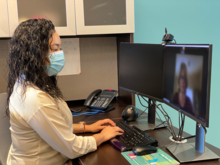Quick Links
Department of Health Administration and Policy
Admissions and Enrollment
HAP Academic Programs
Research and Faculty
Contact Us
Department of Health Administration and Policy
4400 University Drive, MS 1J3
Peterson Hall, Ste. 4400
Fairfax, VA 22030
(703) 993-1929
hap@gmu.edu
Our health policy and economics faculty collaborate with health insurers, hospitals, physicians groups, state and federal government agencies, and public health entities to conduct program and policy evaluations, cost-effectiveness studies, and outcomes research studies. Our team is nationally recognized with an active extramural funding portfolio.
Meet Our Faculty
- Priyanka Anand
- Alison Evans Cuellar
- John Cantiello
- Gilbert Gimm
- Debora Goldberg
- Jeah Jung
- Panagiota Kitsantas
- Hansoo Ko
Supporting Institutions
- Agency for Healthcare Research & Quality (AHRQ)
- American Institutes for Research
- CareFirst Blue Cross Blue Shield of Maryland
- Department of Veterans Affairs (VA)
- Fairfax County Department of Health
- Jeffress Trust
- MacArthur Foundation
- National Institutes of Health (NIH)
- National Institutes of Science and Technology (NIST)
- PNC Foundation
- The Robert Wood Johnson Foundation (RWJF)
- Virginia Department of Medical Assistance Services (DMAS)
- Westat Inc.
Current Research News Feed
- November 8, 2022Professor of Nursing Rebecca Sutter, along with faculty and students across colleges, will lead the creation of an interprofessional Learning Laboratory for Community Health.
- October 19, 2022George Mason Associate Professor of Health Administration and Policy discusses the importance of job-protected paid leave.
- October 3, 2022Anand Discusses Research on Paid Family Leave with U.S. Policymakers
- August 18, 2022A new study from Health Administration and Policy Professor Alison Cuellar shows cost savings to insurance companies for telehealth visits because many people substitute virtual visits for in-person visits.
- May 7, 2022Paid leave policies do not always include job protection: US President's 2022 Economic Report
- May 6, 2022Paid leave mandates reduce likelihood of decreasing paid work hours after a spouse’s health shock, study shows.
- May 6, 2022The “2022 Economic Report of the President” featured Associate Professor of Health Administration and Policy Priyanka Anand’s research on the impact of paid family leave mandates on labor supply and caregiving decisions following a spousal disability.
- May 2, 2022Rising health care costs weigh on CT small businesses and nonprofits.
- May 1, 2022Rising health care costs weigh on CT small businesses, nonprofits.
- May 1, 2022Rising health care costs weigh on CT small businesses, nonprofits.
- February 9, 2022George Mason University: NIHCM Grant Recipients Takes Collaborative Approach On Health Equity, Medicaid Telehealth Policy.
- January 26, 2022A new study from Priyanka Anand, associate professor in the Department of Health Administration and Policy, found that notifications of debt related to work-related overpayment discourage work among SSDI beneficiaries.






